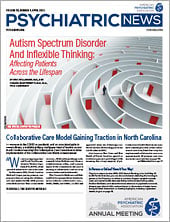The AMA House of Delegates is the AMA’s policymaking body. Specialty section councils were established by the AMA House of Delegates to provide for the deliberation and study of scientific, educational, and other appropriate interests and concerns of national medical specialty societies and their disciplines within the AMA. Societies represented in the House of Delegates may appoint representatives to the specialty section councils for the medical specialty of which it is a part. Such representatives must be AMA members. The Section Council on Psychiatry is made up of delegates and alternate delegates representing APA, American Academy of Psychiatry and the Law, American Academy of Child and Adolescent Psychiatry (AACAP), and American Association for Geriatric Psychiatry.
Dr. Dionne Hart (APA Delegate): The AMA is a professional membership organization that was founded in 1847. The AMA’s mission is to “promote the art and science of medicine and the betterment of public health.” As an African American female physician, I am painstakingly aware of the AMA’s roots in systemic racism and sexism. As a medical student, I would have never imagined how much I would identify with the AMA’s mission and engaged in its strategic activities.
As the inaugural chairperson of the AMA’s Minority Affairs Section, I searched the AMA’s archives to read testimony from the House of Delegates meetings when the membership of Black physicians was debated and repeatedly denied. Yes, racism is in the AMA’s roots, but in the last six decades the AMA has intentionally engaged in activities and initiatives not only to eliminate elements of racism and sexism within its own organization but to end systemic racism in the nation’s health care system through its Center for Health Equity.
As a psychiatric physician, advocate, and a member of APA’s delegation to the AMA, I have been honored to witness my colleagues’ dedication to improving the health of patients living with mental illness through their advocacy actions within the AMA. Time and time again, the delegation has authored AMA resolutions and policies and also provided passionate testimony to advance mental health parity, increase access to mental health care, and improve treatment outcomes. The Section Council on Psychiatry represents both general psychiatry and psychiatric specialties, but we are united in our efforts to improve the lives of all patients living with mental disorders. These are among the many recent AMA actions and resolutions in which the AMA supported psychiatry’s issues:
•
Advocacy for continued flexibility of telehealth regulations after the Public Health Emergency ends.
•
Education of physicians and the public about the 988 National Suicide Prevention Lifeline and advocacy for additional federal and state funding to continue its implementation.
•
Numerous actions related to addressing the opioid crisis in this country under the leadership of APA member Patrice Harris, M.D., M.A., chair of the AMA Task Force to Reduce Opioid Use. She was also the first African American woman to be elected AMA president.
•
Opposition to the use of ketamine and other sedative/hypnotic agents for agitated individuals solely for law enforcement and the diagnosis of “excited delirium” unless a clear set of criteria for the diagnosis is validated.
•
Repeated support of parity coverage for the treatment of mental illness and substance use disorders.
•
Resolution to work with the Centers for Disease Control and Prevention, in collaboration with other public and private organizations, to develop recommendations and/or best practices for media coverage of mass shootings. This includes informed discussion of the limited data on the relationship between mental illness and gun violence and recognition of the potential for exacerbating stigma against individuals with mental illness.
Dr. Karen Pierce (AACAP Alternate Delegate): As a White female physician who trained when less than 3% of medical school class enrollment were women, I engaged with the AMA in medical school and residency when work hours were inhumane. Early on I recognized that self-care was a part of patient care. Alongside other AMA members, I advocated for change to ensure medical trainees would have an opportunity to function at their best by implementing work hour limitations. We advocated for rest periods and protected time to transfer care to improve patient safety. Although our efforts met resistance, we were rewarded with sustained changes.
I also witnessed the sexism, classism, homophobia, and elitism present within the AMA, a male-dominated organization with limited opportunities for women. My early experiences were a clear contrast to the modern AMA. The AMA has changed, and it evolves because of early “sheroes” and a diverse number of voices like yours within the Minority Affairs Section, the Women’s Section, the Young Physicians Section, the Resident and Fellow Section, and Medical Student Section as well as the Advisory Committee on LGBTQ Issues. These members are consistently advocating for equitable change internally and in all areas of the nation’s health care system and governance. The change has demonstrated to Congress, including its 17 physician members—four senators and 13 representatives—that the AMA is a champion for scientific discovery, public health, medical justice, equity, and wellness.
If any APA member has an issue, concern, or resolution idea, please reach out to the APA delegation at the AMA.
Dr. Hart: In the last two decades, delegates include more women and are younger and more racially and ethnically diverse. We urge all APA members to consider joining the AMA; it will increase psychiatry’s influence in the House because delegates are apportioned on the basis of the number of individuals who are members of both APA and AMA. ■


